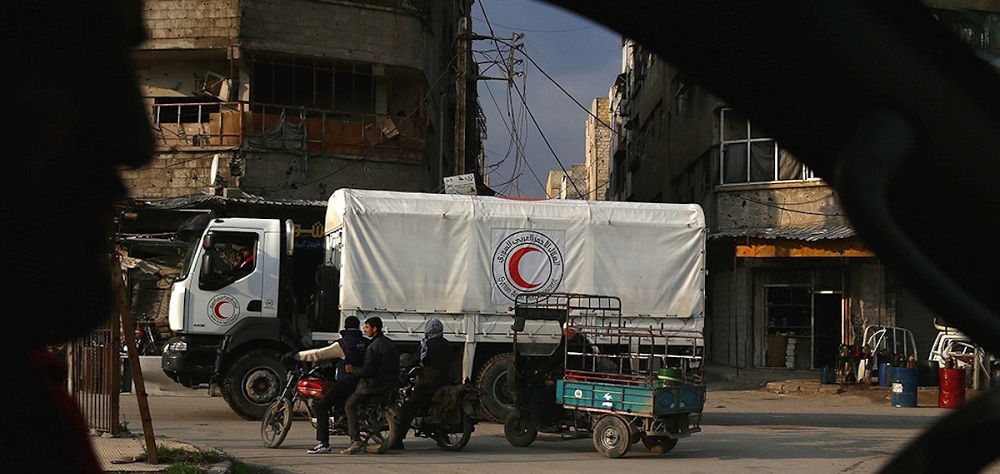Alwaght- At the time being, political and economic consequences are an inseparable part of any crisis or natural disaster like flood, drought, and earthquake. Syrian and Turkey earthquake presents the latest example. In Turkey, the opposition forces are instrumentalizing the earthquake consequences to take down President Recep Tayyip Erdogan from power after 20 years of rule. In Syria, while aware of the government’s shortcomings for management of crisis in the earthquake-hit regions and destruction of a large part of the country’s infrastructure by the devastating decade-long war, the Western countries are refraining from sending aids and lifting the sanctions.
This politicization of the aids is, in turn, widely criticized because of the negative impacts it can leave on the preliminary response to the crisis and keeping focused on rescuing operations, especially that a tough winter storm is now threatening the life of the survivors and those still trapped under the rubble. The last Monday earthquake was magnitude 7.8, similar to the 2005 earthquake that hit Pakistan and killed over 80,000 people with destructive effects.
Erdogan assumed the power in 2002 following heavy waves of public anger at the government management of the 1999 earthquake. History seems to be repeating itself and three months to the presidential and parliamentary elections, the opposition are seizing the opportunity to remove Erdogan from power should the elections not postponed.
His rivals have already began their attacks on Erdogan for his weak response to the disaster, arguing that he has not prepared the country over the past two decades for this inevitable crisis. Experts blame the poor implementation of construction rules as what mainly made the earthquake fatal.
Kemal Kılıçdaroğlu, the leading figure of the opposition, said last week that this disaster is a time for unity and solidarity, not criticism. He, however, changed his stance on Wednesday and accused the government of not cooperating with local authorities and undermining non-government organizations (NGOs).
Kılıçdaroğlu added that he refuses to see what is happening above politics and align with the ruling party. “This collapse is exactly the result of systematic political profiteering.... If someone is response for this situation, it is Erdogan. He and his party failed to prepare the country for this disaster over the past 20 years.”
On the other hand, critics have attacked the three-month state of emergency declared by Erdogan in the wake of the earthquake, which gives the government broad powers with potential benefits to the president. Critics argue that these extraordinary powers would become Erdogan’s launching pad to project himself as Turkey’s ultimate and inevitable savior and leader. Gokce Gokcen, vice president of Republican People’s Party (CHP), said: “If the powers are abused, we will not recognize the state of emergency laws.” Gokcen added that Erdogan initially ignored the mayors of opposition-held cities inside the quake-hit area, and the central government blocked aid convoys from the Istanbul Municipality, which is run by the CHP because all aid was supposed to be coordinated by the state aid agency.
This criticism which targets Erdogan with electoral purposes has so far failed to captivate public attention as people primarily focus on rescue operations at these difficult times. In a video published on social media, a 20-year-old man, who is seen with bags full of clothes and blankets to help the earthquake victims, was asked if the Erdogan government has done enough to help the victims. He replied: “They have done what they can do. Now is not the time to talk about politics, it is time to help people who need help.”
Erdogan still has allies in the region who can strengthen his government’s aid campaign and prevent rivals from exploiting the situation. The visit to Turkey of the Emir of Qatar Sheikh Tamim bin Hamad Al Thani just a few days after the earthquake and promise of such aids as 10,000 container homes to the earthquake victims can once bolster Erdogan’s government.
In Syria, the earthquake response and aid is more politicized than in Turkey. Devastated by 12 years of conflict and crisis, Syria had the least preparation to respond to such crisis. Its infrastructure is badly decrepit and the country is under paralyzing Western sanctions. Thousands of earthquake victims are already displaced and living in camps. Despite the Western claims that humanitarian aids are excluded from sanctions, the Syrian officials have a different account and talk about high impact of the sanctions on receiving international aids. Caesar and Captagon acts by the US Congress that target any trade and contacts with Syria have so far set up the main barrier to the rescue and aid operations and, indeed, caused the casualties to considerably rise. Still, in largely show move to mislead people and distract them from the US role in their plight, the Department of Treasury on Thursday issued a 180-day exemption to Syria sanctions for disaster aid.
Syria’s foreign ministry responded with a statement, arguing that the American waiver was just “sham and misleading” and actually, the new decision emphasizes that the US intends to maintain the sanctions. The statement added that the American administration cannot fool the people of Syria and the world to mend its image and escape the responsibility for obstruction of the rescue operations and aids to the victims. This American practice was witnessed in the form of restrictions on Iranian drug imports under the “maximum pressure” campaign adopted by the US and its European partners under Donald Trump.



























